Institutional vulnerability and governance of disaster risk reduction: macro, meso and micro scale assessment
With case studies from Indonesia:
This PhD research addresses two central questions: How should institutional vulnerability that shapes disaster risks and disaster reduction policy be assessed? How does the quality of institutions and governance influence the level of disaster risk and disaster reduction policy? In this dissertation, institutional vulnerability at global and local levels is analyzed and an answer to such questions is pursued. It is hypothesized that the countries with greater institutional quality tend to have better governance over disaster risks, which leads to a higher level of disaster risk resilience.
The findings show that both qualitative and quantitative methods at different scales of governance can assess institutional vulnerability and the governance of disaster risk reduction. At a global level, a quantitative approach to measuring institutional quality and governance disaster risk reduction is possible thanks to recent global data on countries’ implementation of the Hyogo Framework for Action; however, more efforts are required in the future. At the meso- and microlevels, this work describes the history of institutions for disaster risk management in Indonesia from the colonial period until the present challenges of decentralized governance. The main message is as follows: without considering institutions, institutional quality, and specific governance of disaster reduction at macro-, meso-. and microscales, disaster risk reduction will not be sustainably implemented.
Explore further
